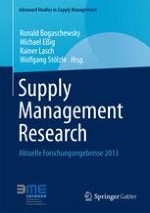2013 | OriginalPaper | Chapter
Quantitative models for value-based supply chain management
Author : Marcus Brandenburg
Published in: Supply Management Research
Publisher: Springer Fachmedien Wiesbaden
Activate our intelligent search to find suitable subject content or patents.
Select sections of text to find matching patents with Artificial Intelligence. powered by
Select sections of text to find additional relevant content using AI-assisted search. powered by
